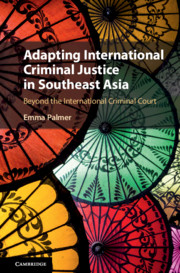Book contents
- Adapting International Criminal Justice in Southeast Asia
- Adapting International Criminal Justice in Southeast Asia
- Copyright page
- Dedication
- Contents
- Tables
- Acknowledgements
- Cases, Laws, and Treaties
- Abbreviations
- 1 Localising International Criminal Justice in Southeast Asia
- 2 Engaging with International Criminal Law alongside an Internationalised Tribunal
- 3 Implementing International Criminal Justice
- 4 Engaging with International Criminal Law as a Non-State Party
- 5 International Criminal Justice in ‘Transition’
- 6 Adapting International Criminal Justice in Southeast Asia
- Book part
- References
- Index
6 - Adapting International Criminal Justice in Southeast Asia
Published online by Cambridge University Press: 28 April 2020
- Adapting International Criminal Justice in Southeast Asia
- Adapting International Criminal Justice in Southeast Asia
- Copyright page
- Dedication
- Contents
- Tables
- Acknowledgements
- Cases, Laws, and Treaties
- Abbreviations
- 1 Localising International Criminal Justice in Southeast Asia
- 2 Engaging with International Criminal Law alongside an Internationalised Tribunal
- 3 Implementing International Criminal Justice
- 4 Engaging with International Criminal Law as a Non-State Party
- 5 International Criminal Justice in ‘Transition’
- 6 Adapting International Criminal Justice in Southeast Asia
- Book part
- References
- Index
Summary
This chapter analyses whether states in Southeast Asia – focusing particularly on Cambodia, the Philippines, Indonesia, and Myanmar – have accepted, rejected, or adapted ideas about international criminal justice. It confirms that there has been significant engagement with international criminal law in Southeast Asia. The chapter then assesses the benefits and limitations of a localisation framework for exploring this process. Using examples from the previous chapters, it explains how approaches to international criminal justice are adapted dynamically over time, across different spaces (not clearly delineated as local/international), and in varying directions (outside-in/inside-out). These findings present constructive ways to complement the ‘localisation’ approach. The chapter ends by identifying several practical implications of this analysis for those advocating for international criminal justice in Southeast Asia, including for the development and implementation of relevant legal frameworks. It argues for a nuanced approach to examining actors' engagement with international criminal justice that is transparent about its normative aims and learns from how diverse actors already draw on adapted arguments to influence legal responses to violence within and across different times and spaces.
Keywords
- Type
- Chapter
- Information
- Adapting International Criminal Justice in Southeast AsiaBeyond the International Criminal Court, pp. 207 - 246Publisher: Cambridge University PressPrint publication year: 2020



